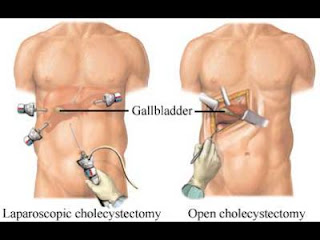Epidemiology
The gallbladder lithiasis is a quite entity, over 10% of the adult population .Etiopathogenesis of gallstones
The etiologic factors:- genetic predisposition
- female sex (women/men ration 2-3/1)
- obesity
- age
- hypoproteinemia
- the number of birth
- diabetes mellitus

Diagnosis
The diagnosis may be clinic, when billiary colic appears or a dyspeptic syndrome suggests a billiary involvementbut very often, the billiary lithiasis is completely or partially asymptomatic.Paraclinical diagnosis-ultrasonographical: gallstones appear as one more hyperreflectogenic images and which cast an “acoustic shadow”. The size and number of calculi may be appreciated by ultrasound examination.
Symptomatic cholelithiasis is that which generated the billiary colics ( a billiary colic is an intense or violent pain located into the epigastrum or the right upper quadrant of the abdomen, sometimes radiating subscapular, persisting usually over a half of hour). Nausea or vomiting that appear in the absence of colic, do not which does not generate billiary colics.
The differential diagnosis
- ulcerous pain
- renal colic
- chronic pancreatitis pain
- dyspepsia dismotility-like
- gallbladder polyp
- gallbladder neoplasm
- billiary sludge
Evolution
The gallstones evolution is often unpredictable. Generally, the symptomatic cholelithiasis produces relatively frequent colics, which may complicate with vesiculat hydrops, acute cholecistitis.Complications
- billiary colic
- vesicular hydrops
- acute cholecistitis
- migration of calculi into the common bile duct
- billiary ileus
- gallbladder neoplasm
Cholelithiasis treatment
The symptomatic gallstones will be treated this traetmen is surgical and more rarely trated by nonsurgical techniques.Medical therapy
- ursodeoxycholic acid(10 mg/kg body/ day)
- Ursofalk or its combining with chenodeoxycholic acid (10-15 mg/kg body/day)
- Litofalk for 3-12 months, up to the complete solubilisation of calculi
Extracoporeal lithotripsy consists of fragmenting the cholesterol calculi by Extracoporeal shock waves; it addresses to the unique or less numerous calculi, preferable under 15 mm. the fragments resulted from lithotripsy will then be solved by administrating billiary acids( ursodeoxycholic acid) up to the complete disappearance of all calculi fragments from the bladder.














0 comentarii:
Post a Comment